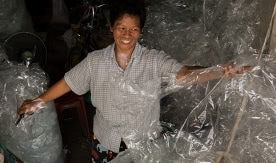Technical Deep Dive: Improving Infrastructure, Services and Livelihoods in Low Income Urban Settlements
-
December 2, 2019 - December 6, 2019
- Tokyo, Japan

WIEGO Senior Advisor Marty Chen participated as a resource expert on urban informal livelihoods in a Technical Deep Dive (TDD) on Improving Infrastructure, Services and Livelihoods in Low Income Urban Settlements. Jenna Harvey and Sonia Dias of WIEGO’s Urban Policies Programme also presented case studies on inclusive urban approaches to street vendors and waste pickers via videoconferencing.
The Tokyo event was organized by the World Bank’s Low-Income Housing and Urban Poverty Global Solutions Group with the World Bank’s Tokyo Development Learning Center (TDLC). The TDD involves 65 persons, including government delegates from a dozen countries.
This was an important platform for knowledge exchange and structured collaborative learning among development practitioners and local/national government officials on issues related to slums and other informal communities and livelihoods for the urban poor. Good practice knowledge, specifically the Bank’s experience on these topics, as well as examples from Japan and other countries, have been highlighted.
WIEGO’s panel on urban informal livelihoods was well received, generating a lot of interest among the government delegates and other participants. After making the links between informal settlements and informal livelihoods, Marty Chen provided an overview of the urban informal economy, the ways in which cities tend to be exclusionary, what informal workers want and need, and several good practice examples of addressing these needs.
Sonia Dias then described the participatory process, in which she served as an advisor, to plan the closure of a large open dump in Brasilia. The closure was done in such a way that waste pickers working on the dump could, by setting up cooperatives and getting city contracts, find alternative employment in the solid waste system. And Jenna Harvey made the case for regulated access to public space for street vendors. She described how organizations of street vendors in India and Peru successfully campaigned for legislation that both regulates and protects street trade, and she shared good practice examples from India and South Africa.
The TDD sought to deepen knowledge in and provide practical tools for the design and implementation of interventions that improve living conditions and opportunities for those living in informal communities, as well as for managing informal economic activity in urban settings. The aim was to create awareness and better inform World Bank Group clients – national and city governments – and other stakeholders on paradigm shifts necessary to address the challenges for populations living in informal communities.
The TDD event covered approaches by the public and private sector and NGOs, with a particular emphasis on innovations and an eye towards scaling up. In doing so, it would contribute to development progress, including towards the achievement of Sustainable Development Goals, specifically Goal 11 to make cities and human settlements inclusive, safe, resilient and sustainable, as well as the World Bank’s goal of reducing poverty and boosting shared prosperity.